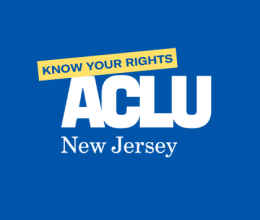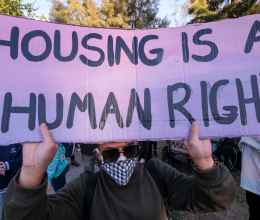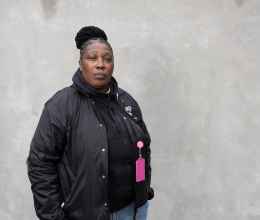
Today marks the two-year anniversary since the murder of George Floyd and subsequent community demands for police accountability across the nation and here in New Jersey. But legislation introduced in the wake of Floyd’s murder has yet to move forward in New Jersey. It is within that context that earlier this week, members of the New Jersey Assembly introduced legislation that would require some municipalities, based on population size and crime rates, to hire additional law enforcement officers based on a formula set forth in the bill. The legislation comes on the heels of recent announcements by the Murphy Administration to use American Rescue Plan dollars to fund an additional state trooper class and to invest in new license place recognition technology. Increased investments in law enforcement officers and surveillance technology do not improve public safety. Time and time again, history has shown us that increased funding to police harms communities of color the most. In response to these announcements, civil rights leaders released the following statements:
“Just last week, I stood side by side on the steps of the statehouse with other civil rights leaders demanding that legislators not use any cannabis revenue for law enforcement purposes,” said Rev. Dr. Charles Boyer of Salvation and Social Justice. “Yet here we are, less than a week later, with another proposal that will ultimately require millions of dollars to be put towards law enforcement. Police killings of Black people and unchecked use of force requires increased police accountability, not more investment into a system that perpetuates harm. These policies will set us back thirty years by fueling the War on Drugs and broken windows policing that led to the mass incarceration of Black and Brown bodies. We saw what happened then, and we know what will happen now. New Jersey already has the worst racial disparities in the country in our criminal justice system. We cannot go backwards.”
“Public safety is about more than policing. Healthy, thriving communities rely on investments in infrastructure and social services, including housing, healthcare, education, and childcare, among other things,” said Rev. Eric Dobson of Fair Share Housing Center. “While potentially well-intentioned, these proposals will do nothing but further harm communities of color. In a state with the worst racial disparities in the country—among multiple indicators of well-being—we must prioritize and fund initiatives that we know will safeguard communities. Mandating more police is definitely not the answer.”
“For far too long, Black and Brown communities have been targeted by flawed policies under the guise of increasing public safety,” said Dr. Jesselly De La Cruz of the Latino Action Network Foundation. “As police budgets inflate, so do rates of arrest, prosecution, and incarceration. And the rates do not rise similarly across race—we know that communities of color will be harmed disproportionately by these policies. Our communities know what will keep us safe and more law enforcement doesn’t make the list.”
“In the two years since George Floyd’s murder, we’ve heard a lot of words about addressing police violence but have seen little legislative action in Trenton,” said Amol Sinha of the ACLU of New Jersey. “The action we have seen has been a consistent prioritization of police over people, and in some cases, outright backlash against accountability and reform. Clearly, policing as we know it is not working, and continuing to increase resources for more of the same is irresponsible and dangerous. This bill will do nothing to address public safety in our communities of color – it will almost certainly infringe upon constitutional rights and will merely double down investments in a broken system that actively harms Black and brown people.”
“Public safety requires creating an ecosystem of safety that includes intervention programs, healing services, and safe passage, not just policing,” said Daamin Durden of Newark Community Street Team. “Communities should not be forced to invest in one piece of the solution over another. Our demonstrated success improving community safety in New Jersey and beyond is a testament to the importance of having those closest to the problem be at the center of the solution.”
“We cannot repeat the mistakes of our past. Tough on crime rhetoric and policies from the 80’s and 90’s landed us where we are today,” said Richard Smith of the NAACP New Jersey State Conference. “We have fought for too long to dismantle decades of structural inequity to allow such misguided policies to move forward. Communities of color deserve more from our elected officials, including real investments in policies and programs that are proven to strengthen communities rather than tear them apart.”
“Keeping our communities safe requires an approach to public safety that goes beyond law enforcement, and our state and local budgets should reflect that reality,” said Nicole Rodriguez, incoming President of New Jersey Policy Perspective (NJPP). “This bill not only comes with a hefty price tag but is not grounded in evidence and is unlikely to have its intended effect. These dollars would be better spent on social services that address the root causes of the issues police deal with through hiring more social workers and mental health professionals, expanding harm reduction services, investing in community violence interruption programs, and building a more robust safety net.”
“True public safety is community led. Those closest to the problem are best positioned to address it, and our voices should be centered in any and all conversations about improving public safety,” said Dr. Liza Chowdry of Paterson Healing Collective. “Public safety requires meaningful funding for the resources that make communities healthy, like housing, employment opportunities, and investments in children’s futures. We know what keeps our community safe, and it’s the lack of access to these resources that erodes public safety. More money for law enforcement will do nothing to address these underlying issues.”
"We all want to be safe, but knee-jerk responses like A587 are not the answer,” said Yannick Wood of the New Jersey Institute for Social Justice. “This bill seeks to expand municipal police forces without supporting data and without similarly expanding services that directly target the root causes of crime. New Jersey needs to expand funding for community-based anti-violence, mental health first responders, prevention, diversion and reentry programs - programs that have been proven to reduce crime.”
“This legislation is nothing more than smoke and mirrors from elected officials, it allows decision makers to avoid accountability for failing to meet the vital socio-economic needs of the community,” said Charlene Walker of Faith in New Jersey. “Instead, Faith in New Jersey is calling on the state legislature to prioritize investing in proven community-based violence intervention programs that include wraparound services. I urge them to utilize the American Rescue Plan (ARP) funds and local budgets to fund these more holistic community interventions at scale for a minimum of three years. They must increase affordable housing, access to livable wages, provide ample funding for education, access to quality child care, end food apartheid, and dedicate their platform to one that centers radical care for their community.”



